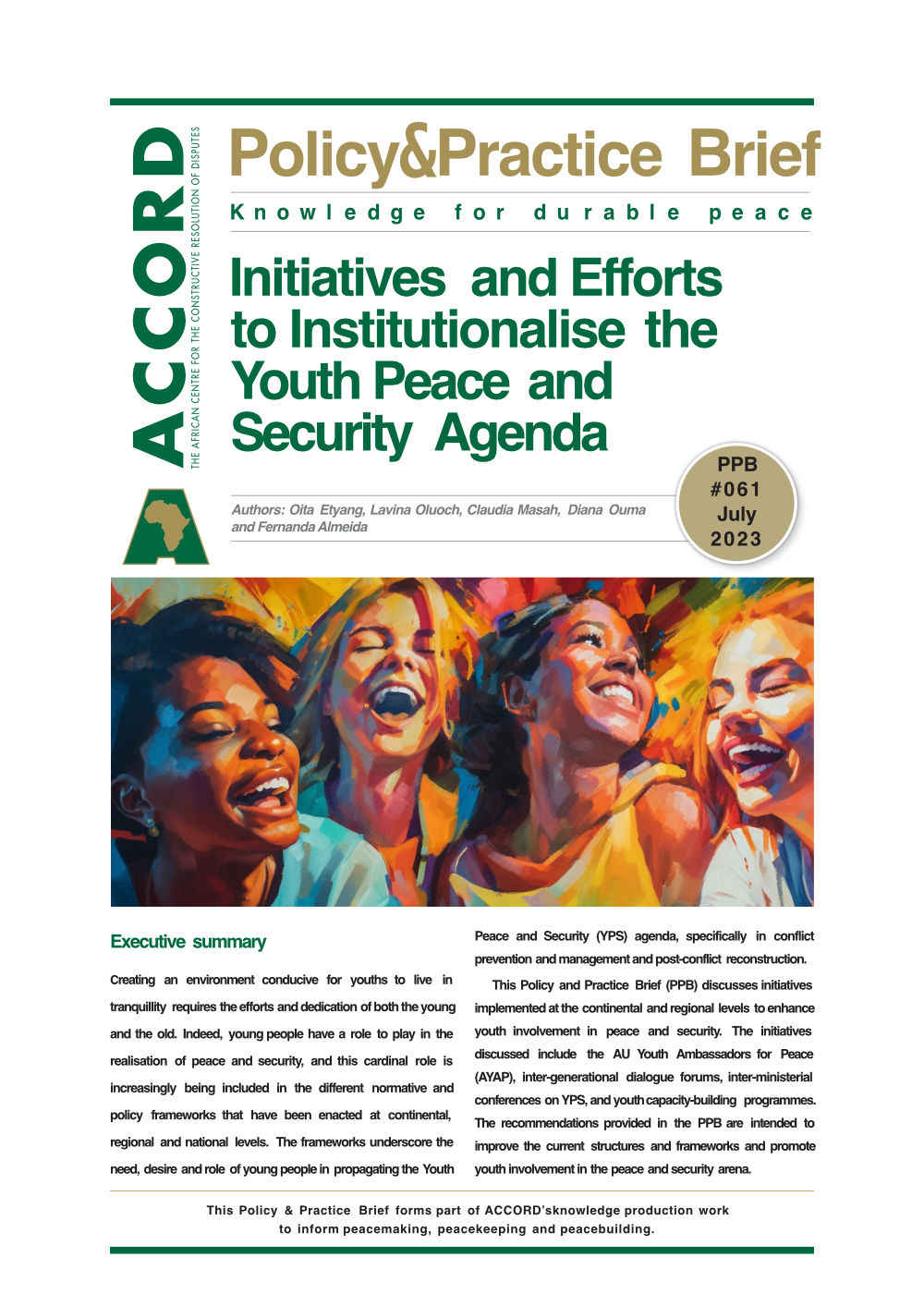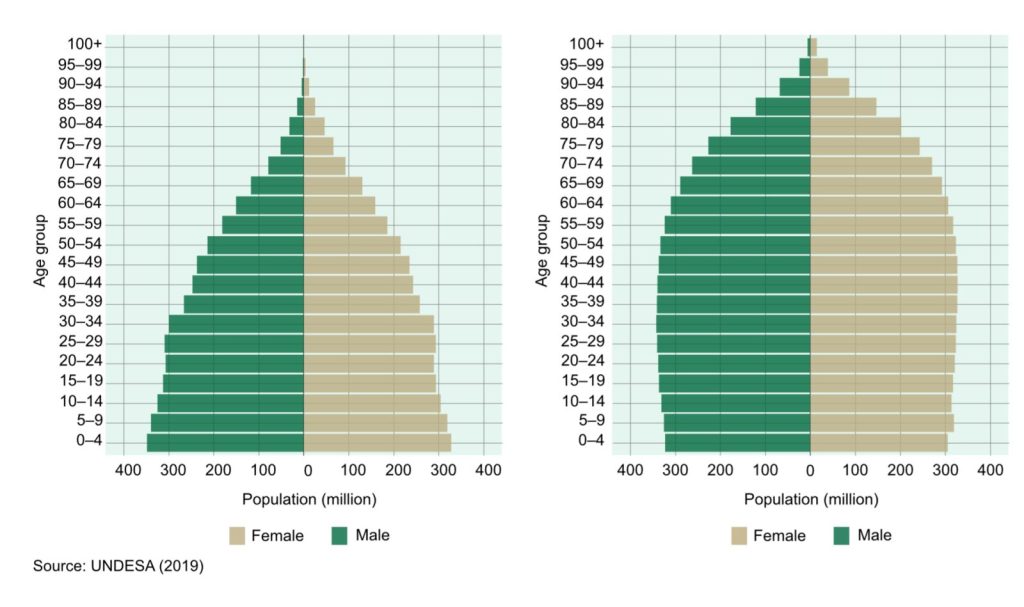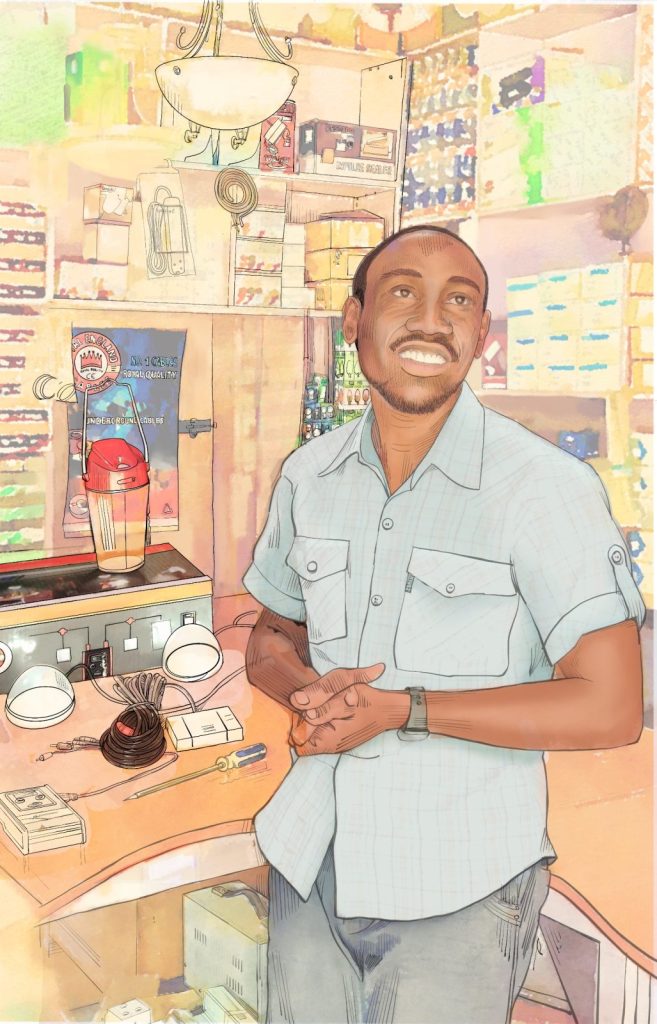
- Policy & Practice Brief
Initiatives and Efforts to Institutionalise the Youth Peace and Security Agenda
This brief analyses the current youth, peace and security agenda on the African continent by looking at the various efforts and initiatives taken at the institutional level to advance the agenda.

Executive Summary
Creating an environment conducive for youths to live in tranquillity requires the efforts and dedication of both the young and the old. Indeed, young people have a role to play in the realisation of peace and security, and this cardinal role is increasingly being included in the different normative and policy frameworks that have been enacted at continental, regional and national levels. The frameworks underscore the need, desire and role of young people in propagating the Youth Peace and Security (YPS) agenda, specifically in conflict prevention and management and post-conflict reconstruction.
This Policy and Practice Brief (PPB) discusses initiatives implemented at the continental and regional levels to enhance youth involvement in peace and security. The initiatives discussed include the AU Youth Ambassadors for Peace (AYAP), inter-generational dialogue forums, inter-ministerial conferences on YPS, and youth capacity-building programmes. The recommendations provided in the PPB are intended to improve the current structures and frameworks and promote youth involvement in the peace and security arena.
Introduction
Youths between the ages of 15 and 29 years constitute approximately 1.8 billion of the world’s total population, which is estimated at 7.6 billion. (see Figure 1 for inference)13UN Department of Economic and Social Affairs (2018) World Youth Report: Youth and the 2030 Agenda for Sustainable Development. New York: UN. The majority of this population (approximately 87%) reside in developing countries, Africa in particular, with an estimated median youth population age of 19.7 years. In Africa, 75% of the population is under the age of 35.14AU (2019) ‘AFRICA’S FUTURE? Youth and the Data Defining Their Lives’, Policy brief, Available at: <https://www.prb.org/wp-content/uploads/2019/10/Status-of-African-Youth-SPEC.pdf>[Accessed 19 May 2023], p. 4. The estimated youth population, particularly in Africa, is projected to increase. It is estimated that 42% of all youths worldwide will be African by 2030.15Ibid, p. 5. These figures have triggered debates and interest among policymakers at regional and continental levels, mainly on how to convert the numbers into economic and developmental dividends. There has been a conscious realisation among policymakers that investing in young people will not only transform their lives but give impetus to community transformation. In essence, the goal is to assist young people “to break intergenerational poverty, address inequalities, and create a stable, peaceful, and prosperous Africa”.16Ibid, p. 4. On a continent where armed conflicts, political tensions, governance deficits, ethnic divisions and inequality, poverty and unemployment are prevalent, as well as other emerging threats to peace and security such as climate change, terrorism and transnational crimes, the youth population has the potential to provide solutions to the problems facing the continent.

While progress has been made to provide youth employment and entrepreneurship through quotas, affirmative action and other financial incentives, there is consensus that the youth continue to be affected by structural vulnerabilities. Vulnerabilities, including inadequate experience and skills, limited job opportunities, job insecurity, inability to access credit, and conflicts, continue to impact young people, albeit differently. These gaps and realities have triggered a paradigm shift in how the youth are engaged and involved in the different spheres. In the realm of peace and security, there has been a deliberate effort to institutionalise the Youth Peace and Security (YPS) agenda. In this context, YPS is understood as:
Conscious actions and processes to protect young people from participation in, and the ill effects of, violent conflicts and insecurity, and to promote and support their contributions to peace efforts in conflict and post-conflict situations.17AU (2020) ‘Continental Framework for Youth, Peace and Security’, Addis Ababa, Ethiopia, AU Press, p. 5.
AU Youth-Oriented Instruments
- AU Constitutive Act (2000)
- AU Peace and Security Council Protocol
- The African Youth Charter (2006)
- Youth Division Programmes
- Silencing the Guns Initiative
- Youth Envoy Action Plan
- Continental Framework for Youth Peace and Security
To actualise and operationalise the above broad definition, normative, policy and institutional frameworks have been formulated to engage the youth in peacebuilding initiatives at global, continental, regional and national levels. The United Nations Security Council (UNSC) Resolutions 2250, 2419 and 2535 underpin the significant role the youth play in peacebuilding and call for their enhanced participation in decision-making processes as well as their meaningful engagement in negotiating and implementing peace agreements in conflict or transition settings. At the continental level, the African Union (AU) has adopted normative and policy regimes, including charters, protocols, declarations and programmes that seek to engage the youth in governance, peace and security. Respective Regional Economic Communities/Mechanisms (RECs/Ms) are also implementing programmes aimed at amplifying youth voices in promoting the peace and security agenda at the regional level.
With the YPS agenda gaining currency at both continental and regional levels, this paper seeks to highlight and take stock of the initiatives, challenges and opportunities. It will reflect on the positive initiatives being implemented by the AU, Common Market for Eastern and Southern Africa (COMESA) and its partners, including Save the Children, the African Centre for the Constructive Resolution of Disputes (ACCORD), and the Horn of Africa Youth Network in the area of YPS. It is envisaged that it will trigger debate and inform policy decisions as far as the YPS agenda is concerned. The paper is organised into three parts: the introduction, which has set the tone for the paper; the next part discusses various initiatives that have been implemented; and the last section provides a conclusion and offers recommendations.
Interrogation of the various initiatives on YPS
Various initiatives, including those indicated below, have been implemented through partnerships to promote the YPS agenda.18The YPS initiatives discussed have mainly been implemented collectively by the AU, Save the Children, the Horn of Africa Youth Network, Institute for Democracy and Electoral Assistance (IDEA) and ACCORD. The joint implementation has been critical in leveraging resources and technical support, thus having a meaningful impact on progressing the YPS agenda. The initiatives are discussed in the following subsections.
Youth Platforms in Africa
- AU Youth Ambassadors (AYAPs)
- COMESA Youth Advisory Panel (COMYAP)
- EAC Youth Ambassadors
- SADC Youth Forum
- ECOWAS Youth Council
- IGAD Youth Forum for Peace
- ECCAS Youth Volunteer Corps
The AU Youth Ambassadors for Peace (AYAP)
As part of the efforts to advance the YPS agenda as well as popularise the Continental Framework on YPS and its 10-Year Implementation Plan, the African Union Commission (AUC) Political Affairs, Peace and Security Department (PAPS) launched the Youth for Peace (Africa) programme with the primary objective of facilitating meaningful participation of young people across the spectrum of peace and security and dissuading them from engaging in violence, conflict and violent extremism. Ipso facto, the AU Peace and Security Council (PSC), during its 807th meeting, mandated the AUC to appoint five regional African Youth Ambassadors for Peace to work with the AU Youth Envoy in promoting and operationalising the YPS agenda on the continent. In collaboration with the RECs/RMs, the AU selected Youth Ambassadors through a competitive process, who are then appointed for a two-year non-renewable tenure. The ambassadors are mandated to advocate for and promote the mainstreaming and inclusion of young people in peace and security initiatives by drawing attention to their contributions, resilience and challenges, encouraging policy and programmatic actions aimed at addressing identified challenges, and ultimately enhancing young people’s contributions in different spheres.19See Nkosi, S., Ako, R., and Ukeje, C. (2022) ‘Youth Ambassadors for Peace: how did they fare?’ Policy brief, Institute of Security Studies, Pretoria, South Africa. In a nutshell, the Youth Ambassadors act as interlocutors between young people and the AU and RECs/RMs in YPS matters.
It has been five years since the first and second cohorts of AYAPS were selected to contribute to the advancement of the YPS agenda on the continent. The AYAPs have carried out different activities and programmes, strategically leveraging their individual networks as well as the collective influence of the AU/RECs to champion the meaningful participation of youths in the YPS discourse. Among other things, the AYAPs have been involved in the training and capacity-building of youth peacebuilders, inter-generational dialogues, and participating in the AU Peace and Security Council (AU-PSC) Open Sessions.20Ibid. The use of AYAPs in training and capacity-building initiatives is viewed as an intentional strategy to rely on other young peacebuilders as facilitators and trainers and promote peer-to-peer learning and experience-sharing, while also addressing the perennial exclusion of youths from specific roles.
AYAPS have also been part of high-level conversations, including participating in the PSC Open Sessions and RECs/RMs convened events. In addition, virtual space has created a platform that the AYAPs have utilised to promote peer-to-peer exchange and intra-generational dialogue, thus drawing more youths into the YPS discourse. At the regional levels, RECs have also established youth platforms to champion and advance the youth agenda in the region. COMESA, for instance, established the COMESA Youth Advisory Panel (COMYAP), which comprises 11 youths from the region. Their roles and responsibilities are, among others, to provide the COMESA Council of Ministers with direct and well-informed advice on matters relating to young people. The East African Community (EAC) has instituted the Youth Ambassador Platform. The SADC Youth Forum was established in the region21The SADC Youth Forum is an independent body in the Southern African region that was formed to galvanise youth voices. It works closely with the SADC Secretariat. to amplify youth voices, not only in regional integration but also in peace and security, and bring together youths and youth organisations. These various youth platforms have recorded noticeable progress in executing their mandate despite some of the challenges faced. The challenges include:
- Limited financial resources: The resources allocated for the youth panels and structures to implement initiatives and programmes aimed at advancing the YPS agenda are limited. Thus they are not able to
- implement activities adequately and realise their full potential. They rely on the goodwill of the AU/RECs and development partners to carry out their activities. This limits the scope of their efforts and implementation.
- Limited reach and awareness: As mentioned earlier, those between 0 and 35 years make up 75% of the African population, and having only five regional youth representatives limits their geographical and numerical reach. Anecdotally, youth networks working at community and grassroots levels in complex conflict situations are not able to access or actively engage in the programmes or initiatives being undertaken by the AYAPs. The ultimate consequence is that many youths in need of programmes or initiatives remain isolated.
- Multiplicity of youth-led architectures: Youth-led architectures have mushroomed throughout the continent. It appears that each REC has a youth ambassador programme or youth advisory panel. The multiplicity of youth-led structures has contributed somewhat to the duplication of efforts, operating in silos, and poor coordination, among others.
Intergenerational Dialogue Forums
Intergenerational dialogue (IGD), as a process of engagement and exchange between different generations, aims to promote mutual understanding, respect and collaboration.22International Socio-economic Research (ISR) Centre (2020) ‘Intergenerational Practice (IP)’, ISR. It involves creating a space for different generations to share their experiences, perspectives and knowledge and to work together towards common goals. In the context of YPS in Africa, IGDs plays a crucial role in empowering young people to take up active roles in shaping their communities and promoting peace, security and societal cohesion.

Since the establishment of the YPS Agenda in Africa, there has been a series of conversations around the advancement of the objectives of the Continental Framework on YPS through IGD forums held around specific thematic areas, including communication, climate change, security sector reforms, security sector governance, knowledge management and youths’ meaningful involvement in decision-making processes and policy reforms, among others. The AU, COMESA and other RECs have been at the forefront in holding IGDs. In November 2022, for instance, COMESA, in partnership with Save the Children and the Horn of Africa Youth Network, organised an IGD in Nairobi, Kenya. The two-day dialogue session brought together young people from the Horn of Africa region, COMESA Committee of Elders (CCOE), parliamentarians and religious leaders. The dialogue forum provided young people from the Horn with an opportunity to dialogue on topical issues. Specifically, the discussions centred on leadership and governance, climate change, peace and security, and youths’ role in promoting the peace and security agenda in the region.
Civil society organisations (CSOs) have also been spearheading these dialogues to propagate the YPS agenda. ACCORD, for instance, has organised a series of IGD sessions with young people from different regions, with the aim of strengthening youth engagement in decision-making, more importantly in the area of peace and security. The IGDs have recorded a fair share of success. Certainly, the IGDs have promoted mutual understanding, respect and cooperation between generations, which is critical in enhancing peace, security and stability in Africa. Additionally, it has provided a platform for young people to reimagine their roles as active agents of change. The IGDs have thus been used to provide young people with skills, knowledge and networks needed to engage and interact in the global world.
Despite the successes, some noticeable setbacks have been encountered. First, some degree of resistance has been highlighted from a cross-section of the older generation, mainly informed by social stereotypes and perceptions that young people are not qualified to engage appropriately with older generations.23Kranz, D., Thomas, N.M., and Hofer, J. (2021) ‘Changes in Age Stereotypes in Adolescent and Older Participants of an Intergenerational Encounter Program’, Frontiers in Psychology, 12, art# 658797, Available at: https://www.ncbi.nlm.nih.gov/pmc/articles/PMC808552 [Accessed 23 June 2023]. Secondly, illiteracy tends to hamper young people’s engagement with policymakers, especially in rural settings. Therefore, to maximise the impact of IGD in enhancing YPS in Africa, it would be important for the various YPS actors and stakeholders to take advantage of intergenerational partnerships that allow younger and older generations to initiate practical collaborations as an added value to the already existing cross-learning processes.
Inter-Ministerial Conferences on YPS
Inter-ministerial conferences on YPS were convened as essential platforms for bringing together different government ministries and agencies to collaborate and coordinate collective efforts in progressing the YPS agenda. The conferences have provided the youth with an opportunity to be heard by governments and engage with different government ministries, including those responsible for youth affairs, foreign affairs, defence and security, to advance the YPS agenda.

The involvement of the ministry of youth in the conferences is premised on the mandate and the responsibility they have towards developing and implementing policies and programmes that target the youth. On the other hand, the ministries of defence, security and foreign affairs are in charge of peace and security issues at both national and regional levels. Therefore, the involvement of the three ministries provides youths with a holistic platform to engage with policymakers and influence policy decisions. Moreover, inter-ministerial conferences have been utilised as platforms to sensitise governments and RECs on the importance of the YPS agenda and ensure that the agenda is integrated into national and regional policies and strategies.
The AU, COMESA, Horn of Africa Youth Network and Save the Children have jointly held four inter-ministerial conferences24The inter-ministerial conferences have been held in the Horn of Africa, Southern Africa, Eastern Africa and Northern Africa. in four regions, including the Horn of Africa, Southern Africa, East Africa, and North Africa, respectively. Key outcomes from these conferences include commitments by several Member States to develop National Action Plans (NAPs) on YPS. The primary motivation for encouraging Member States to develop NAPs is rooted in strengthening the institutionalisation of YPS initiatives at national levels. This is seen as a crucial step toward ensuring a more robust and effective implementation of YPS principles and policies. Its development additionally provides a broader framework for structured stakeholder engagement in YPS. In summation, the outcomes of these conferences reiterate the need for continuous capacity strengthening on the YPS agenda as well as the continuous sensitisation of governments and RECs/RMs.
Youth Capacity-Building Initiatives
Different initiatives have been implemented towards enhancing youth knowledge and capacity to engage in the decision-making arena. Through capacity-building initiatives, young people can facilitate and promote peace, working individually or collectively, in their communities through peacebuilding and conflict resolution mechanisms. Capacity building further strengthens young people’s roles as peacebuilders, amplifies their engagement in economic development, and shapes their survival skills. The AU, RECs and CSOs have continued to hold capacity-building and strengthening sessions with a view to transforming young people. In collaboration with other partners, COMESA has, for example, held several bootcamps and training sessions in regional integration, conflict prevention, and early-warning tools with young people in the region. They have also been capacitated with skills through mentorship programmes, including research, advocacy, leadership and public speaking, among others.
While capacity building is integral in youth transformation, in many cases, it is hampered by limited budgetary allocations and limited reach, especially to youths in rural settings. Lastly, youths are not homogeneous, including in terms of their capacity-building needs. Thus, sometimes, it is difficult to tailor capacity-building initiatives to their needs. In most cases, organisations tend to apply an ‘omnibus approach’. In a nutshell, capacity building of young people should entail a systematic approach that seeks to harness their skills in communication, advocacy, leadership, project management, negotiation, mediation, and accountability. In essence, it is a holistic approach aimed at transforming young people.
Conclusions and Recommendations
Robust legal and policy frameworks have been put in place to guide and inform youth engagement in the different spheres of peace, security and post-conflict reconstruction and development. Indeed, the creation of youth platforms at different levels has provided the impetus for mainstreaming the YPS agenda continentally, regionally and nationally. While there are challenges, a nuanced analysis of the various initiatives indicates that young people are progressively using the space to contribute to the peace agenda.
Suggestions to enhance youth engagement and participation in peace and security are outlined as follows:
AU and RECs/RMs
- Encourage greater synergy between AYAPs and other platforms established by the AU and RECs/RMs to ensure coherence and collective efforts in progressing the YPS agenda at various levels. This includes establishing an AU and RECs/RMs youth multi-stakeholder dialogue platform to minimise duplication of efforts and the silo mentality.
- Continue building and strengthening personal and institutional capacities of youth peacebuilders and networks to understand and contribute to YPS in the African context, in line with the AU’s normative frameworks. This can be done through training initiatives, mentorship, and encouraging and supporting youth innovation.
- Increase awareness and sensitisation of stakeholders, including governments, RECs and youth-led organisations, on the importance of the YPS agenda and the development of country context-specific NAPs, as well as the critical role young people play in promoting peace and security.
Member States and Governments
- Develop and implement tailored and context-specific NAPs. The action plans should be anchored to international, continental and regional normative frameworks and take into account best practices and lessons learnt. Moreover, it is of essence that the developed NAPs on YPS reflect each country’s specific governance, peace and security context to promote significant engagement of young people in this context within their national sphere. In addition, Member States should be encouraged to operationalise policies and strategies that integrate the YPS agenda.
- Support quality education for peace to enable youths to engage constructively in civic structures and inclusive political processes, educating young people in human rights and active citizenship, and promoting youth activism and engagement, for example, through policy strengthening.
CSOs
- Invest in intergenerational partnerships at all levels that allow younger and older generations to initiate practical collaborations as added value in existing cross-learning and promote common problem-solving. This should be encouraged at the grassroots level.
Authors
Oita Etyang holds a PhD in Political Science from the University of Johannesburg (RSA). Dr Etyang has over a decade of experience across Africa, covering the wider spectrum of conflict prevention, management, resolution and post-conflict reconstruction processes.
Lavina Oluoch is an International Development Practitioner and passionate Humanitarian, Human Rights Advocate, and Protection Specialist. She has seven years of experience in strategic leadership, operational management and coordination of multi-country programmes.
Claudia Masah has a Master’s degree in political science and strategic studies from the University of Yaoundé 2, Cameroon. Claudia’s interest is in the area of Peace and Security across Africa. She has over five years of experience in conflict prevention with a focus on YPS.
Diana Rose Ouma is a Programme Coordinator for the She Leads Regional Program/Communications and the Advocacy lead at the Horn of Africa Youth Network. Her focus areas encompass governance, peace and security: championing UNSCR 2250 and 1325, climate justice, and economic empowerment.
Fernanda Almeida is a geographer working in the humanitarian sector. Her research interests stem from her desire to understand global transformation processes and how these interact with and influence what occurs in Global South countries.
